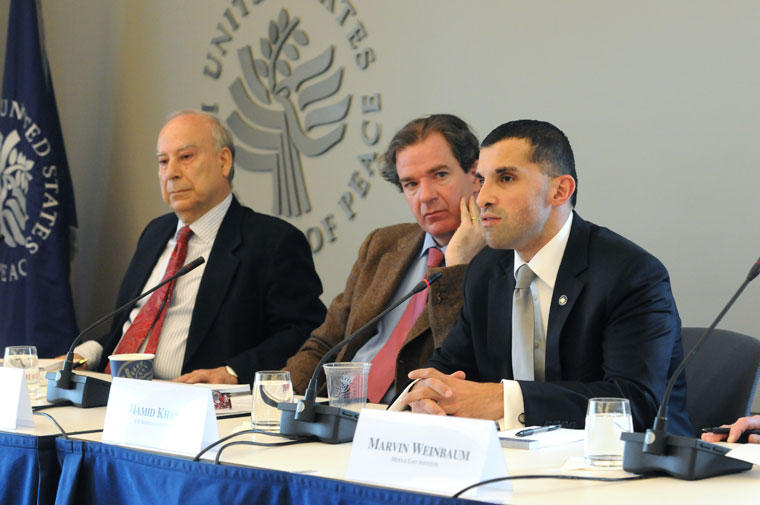Counterterrorism efforts, including strikes at suspected militants by unmanned U.S. drone aircraft, are worsening already damaged relations between tribal areas of Pakistan and the country’s central government, and the approach should be rethought, a leading scholar of Islamic studies said recently at USIP.

Counterterrorism efforts, including strikes at suspected militants by unmanned U.S. drone aircraft, are worsening already damaged relations between tribal areas of Pakistan and the country’s central government, and the approach should be rethought, a leading scholar of Islamic studies told an audience at the U.S. Institute of Peace (USIP) and those watching a live webcast on April 15
Akbar Ahmed, the Ibn Kahldun chair of Islamic studies at American University in Washington and former Pakistan high commissioner (ambassador) to the United Kingdom and Ireland, discussed his new book, “The Thistle and the Drone: How America’s War on Terror Became a Global War on Tribal Islam,” which draws on 40 case studies. It is the third in a trilogy of books. Ahmed said that after nearly a decade of stepped-up counterterrorism efforts, including both U.S. operations and those of Pakistan’s Army, the situation in the tribal areas in northwestern Pakistan is “a grim one.” Said Ahmed, “We don’t hear the ordinary people of Waziristan, the people who are caught up in this violence….Is this how we are helping the people we are meant to help?”
Waziristan, one of Pakistan’s Federally Administered Tribal Areas (FATA), is a mountainous region along the Afghan frontier that is populated by ethnic Pashtuns; it is a key area in the Pakistani government’s counterterrorism campaign, as well as U.S. efforts. The strikes are deeply unpopular among people in the region and in Pakistan generally.
Ahmed, who once served as the Pakistani government’s political agent in the South Waziristan Agency, said that the pattern in the tribal areas is that killings prompt yet more killings. “We need to sit back, pause and come up with long-term solutions,” he said. “The entire society cannot be condemned in this broadbrush manner.” The U.S. approach, he argued, is broadly seen by Pakistanis as an infringement on national sovereignty. “The drone has become a dreadful symbol of violence,” he said.
“The answer has to come from within the tribal society,” Ahmed added. “There has to be a local solution to a local problem.”
Peter Bergen, director of national security studies at the New America Foundation, cautioned that at times drone strikes represent “the least bad choice” in areas thick with extremists. He noted that militants used earlier withdrawals by Pakistani forces to expand their reach in the tribal areas.
New America Foundation statistics indicate that the number of U.S. drone strikes in Pakistan is falling dramatically, with 122 in 2010, 73 in 2011 and 48 last year. According to New America, six such strikes have occurred so far this year. It estimates that between 1,990 and 3,308 people have been killed in Pakistan drone attacks. Bergen cited better intelligence and smaller payloads, among other factors, as resulting in more accurate targeting of militants and a reduction of civilian deaths as the campaign proceeds. NAF estimates that two percent of total deaths in 2012 were civilians in comparison to an estimated 54 percent to 61 percent in the period 2004-07.
Bergen also cited a 2010 public opinion survey of 1,000 FATA residents funded by USIP. The survey found that nearly nine out of 10 people in FATA oppose the U.S. military attacking al-Qaida and the Taliban in their region, and more than three-quarters oppose U.S. drone strikes.
Hamid Khan, an Afghanistan specialist and senior program officer in USIP’s Rule of Law Center, raised other issues related to the use of drones, including whether the principle of “anticipatory self-defense” will be used by other countries considering drone attacks in the future. Khan said anti-U.S. sentiments in the Pakistani tribal areas reflect a perception that Pakistani national sovereignty is being violated, and those views “need to be taken at face value.”
The perception, Khan said, is that “drone strikes, by their nature, appear to be weapons of terror.” They have been used by militants to promote a narrative that the United States has been conducting a war against Islam, he said, adding, “It feeds a larger extremist ideology.”